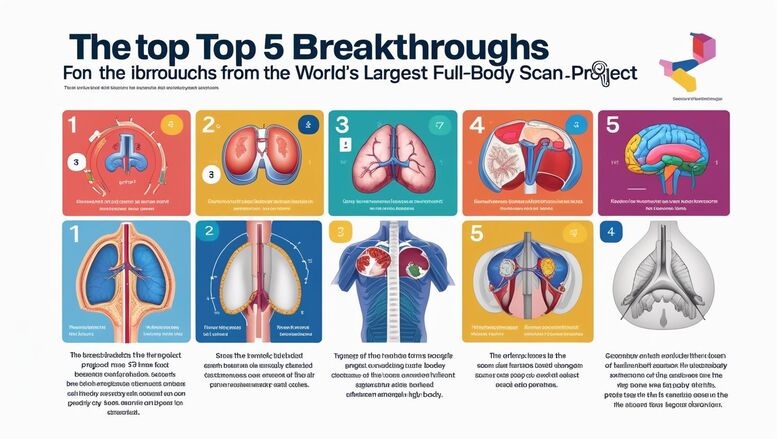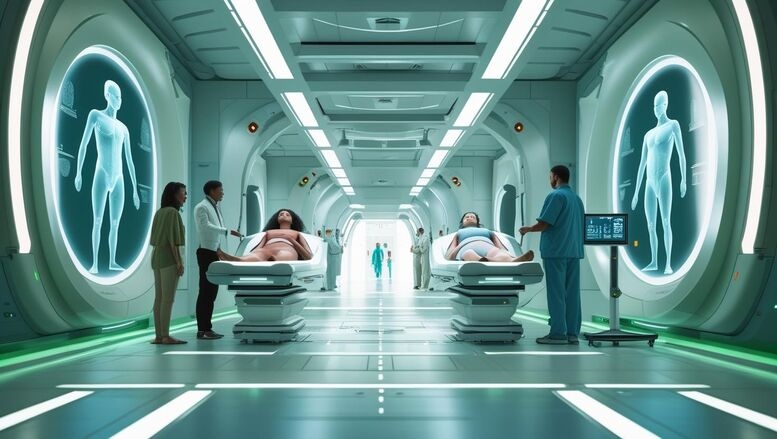In a groundbreaking step toward early disease detection and personalized healthcare, the world’s largest full-body scan project is taking shape with massive scale and ambition. This full-body scan project is revolutionizing how we approach preventative medicine by using state-of-the-art imaging, AI-powered diagnostics, and population-scale health data.
Whether you’re a healthcare enthusiast, a tech visionary, or simply curious about the future of medicine, understanding the scope and impact of this it is essential.
What Is the Full-Body Scan Project?
The full-body scan project refers to a large-scale medical initiative aimed at scanning the entire bodies of thousands (and eventually millions) of participants to detect hidden or early-stage diseases. Unlike traditional health checkups that focus on symptoms, this project uses advanced MRI and CT technologies to visualize organs, tissues, and blood vessels in incredible detail — often before symptoms even appear.
Backed by top-tier medical institutions and AI research labs, the it combines data science, imaging, and clinical research to create a new gold standard in preventive care.
🔗 Recommended resource: What is a Full-Body MRI Scan?
Who Is Behind the World’s Largest Full-Body Scan Project?
One of the most notable examples is the UK Biobank Imaging Study, which aims to scan over 100,000 individuals. In the United States, tech entrepreneur-backed companies like Prenuvo and Ezra are pioneering similar efforts with hundreds of thousands of scans already conducted.
The UAE has also launched its own national full-body scan project, targeting over 1 million scans by 2030 as part of its “Vision 2031” health initiative.
This global push positions the full-body scan project not just as a diagnostic tool but as a proactive healthcare movement.
Why Is This Project So Important?
- Early Detection Saves Lives
The main goal of a full-body scan project is early detection. Diseases like cancer, aneurysms, fatty liver, and cardiovascular issues often go unnoticed until it’s too late. Early discovery through full-body scans drastically improves survival rates. - Data-Driven Personal Healthcare
With millions of scans, this full-body scan project creates one of the richest health databases ever assembled. This allows researchers to spot patterns and predict risks more accurately. - Artificial Intelligence Integration
AI tools can now identify tumors, blockages, and even brain anomalies from full-body scans faster and more accurately than human radiologists — making the full-body scan project even more powerful.
What Does the Scan Include?
A typical full-body scan project includes:
- Brain and spinal cord imaging
- Chest scans (heart and lungs)
- Abdomen (liver, pancreas, kidneys)
- Pelvic area
- Musculoskeletal system
- Fat and organ composition analysis
These comprehensive scans usually take about 60–90 minutes, and the findings are interpreted by radiologists and AI models in tandem.
Real-World Benefits of the Full-Body Scan Project
1. Undiagnosed Cancer Detection
Many participants in the full-body scan project have had tumors identified that traditional tests missed. This has helped thousands begin treatment earlier.
2. Cardiovascular Risk Prediction
Scans detect arterial plaque, weak heart muscles, and other red flags that signal future heart attacks — a feature that makes this is a lifesaver.
3. Neurological Insights
AI-enhanced neuroimaging reveals risks for Alzheimer’s and Parkinson’s even before symptoms begin, offering hope for early intervention.
Ethical and Privacy Considerations
With large-scale data collection comes major ethical responsibility. All data collected in the full-body scan project is anonymized and encrypted. Participants provide full consent, and research institutions comply with stringent data protection laws like GDPR and HIPAA.
Still, debates continue about data ownership, AI biases, and healthcare access — issues that need resolving as the scales.
Cost and Accessibility: Who Can Join?
Early versions of the full-body scan project were expensive, with scans costing upwards of $2,500. However, as technology advances and adoption increases, the costs are falling.
- In the UK, many scans are free through public health partnerships.
- Private firms now offer scans for $500–$1500 in the U.S. and UAE.
- Some insurance providers are starting to reimburse part of the cost for preventive purposes.
This makes the full-body scan project more accessible to the general public each year.

Challenges Facing the Project
No innovation is without obstacles. The full-body scan project faces the following key challenges:
- Overdiagnosis: Detecting benign anomalies that lead to unnecessary anxiety or treatment.
- Cost Burden: Scanning millions of people is expensive, even with automation.
- Workforce Limitations: There are not enough trained radiologists in many regions.
- Data Complexity: Interpreting vast amounts of scan data is a serious technical hurdle.
Yet, most experts believe these issues can be solved with AI and policy support.
The Role of AI in the Full-Body Scan Project
Artificial intelligence is the backbone of the modern full-body scan project. Companies are building machine learning models trained on tens of millions of images to:
- Detect minute abnormalities
- Prioritize urgent findings
- Create 3D body maps
- Predict long-term health outcomes
For example, Google’s DeepMind and IBM Watson Health are exploring models that integrate full-body scan project data into AI-driven risk assessments.
Global Expansion of the Full-Body Scan Project
Here’s how different countries are embracing the full-body scan project:
| Country | Project Size | Funding | Status |
|---|---|---|---|
| UK | 100,000+ | Gov + Private | Active |
| UAE | 1 million | Gov-led | 2030 target |
| USA | 500,000+ | Private | Expanding |
| Japan | 250,000+ | University-backed | In Progress |
| Germany | 300,000+ | Insurance-backed | Piloting |
These numbers indicate a massive investment in the project, confirming it as a global trend rather than a niche experiment.

Future of the Full-Body Scan Project
Looking ahead, the project could:
- Become a yearly check-up standard
- Enable predictive medicine tailored to your genetics and scans
- Feed AI models that offer real-time diagnostics
- Make personalized healthcare universally accessible
🔗 Learn more: Future of Preventive Medicine
Imagine walking into a clinic, getting scanned, and walking out with an AI-generated health report — personalized, actionable, and backed by global data from the project.
Final Thoughts
The world’s largest full-body scan project is more than a medical milestone — it’s a societal transformation. From improving longevity to reducing healthcare costs and enabling predictive care, this ambitious initiative is reshaping the future of medicine.
By merging imaging, artificial intelligence, and population-scale research, the is setting a new benchmark for proactive healthcare. As access expands and costs drop, it’s only a matter of time before full-body scans become as routine as a blood test.
